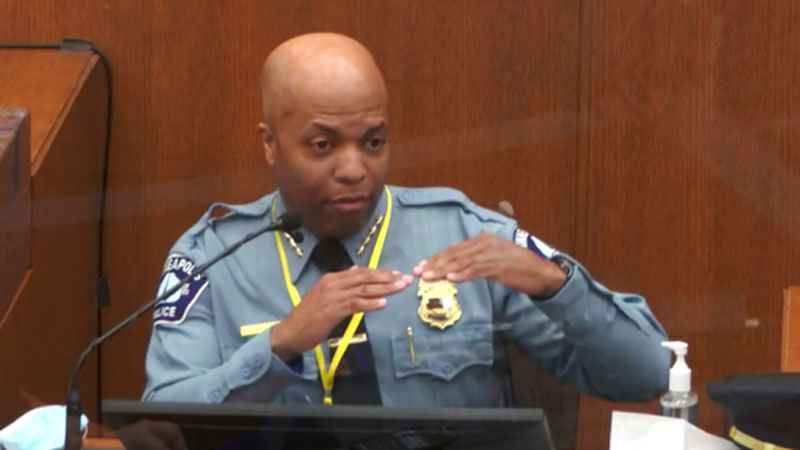Legal expert says Chief Medaria Arradondo’s testimony will resonate with jurors
[anvplayer video=”5019474″ station=”998122″]
With Derek Chauvin sitting across from him in the courtroom, Minneapolis Police Chief Medaria Arradondo condemned the former officer’s actions.
“I vehemently disagree that that was the appropriate use of force for that situation,” said Chief Arradondo, in reference to Chauvin’s use of force on May 25, 2020.
When asked by the state, he testified that Chauvin violated department policy.
“The conscious neck restraint by policy, mentions light to moderate pressure," Arradondo said. "When I look at Exhibit 17 and when I look at the facial expression of Mr. Floyd, that does not appear in any shape or form that that is light to moderate pressure."
Chauvin’s attorney Eric Nelson challenged that claim, asking whether the chief has a degree in physics. Arradondo responded no.

In this image from video, witness Minneapolis Police Chief Medaria Arradondo testifies as Hennepin County Judge Peter Cahill presides Monday, April 5, 2021, in the trial of former Minneapolis police Officer Derek Chauvin at the Hennepin County Courthouse in Minneapolis. Chauvin is charged in the May 25, 2020 death of George Floyd. [Court TV via AP, Pool]
“And in terms of the amount of pressure or force that was actually applied to Mr. Floyd, you would not be qualified to speak to that, agreed," Nelson asked.
Chief Arradondo replied, “Agreed.”
University of St. Thomas Law Professor Mark Osler noted how calmly the chief moved on from Nelson’s question.
“Which is what good witnesses do, and that’s how law enforcement witnesses are trained,” Osler said. “I do think that’s going to matter in terms of him establishing his authority, his experience and then saying very plainly this wasn’t the way it’s supposed to go.”
Arradondo: Kneeling on Floyd’s neck violated MPD policy
Arradondo emphasized the sanctity of life as the state questioned him about the use of force and de-escalation policies. He was on the stand for more than four hours.
“They went right back to brass tacks: what is the mission statement of the police department,” Osler said. “What I think they were doing was just setting out the building blocks of principles on top of which the rules were going to be formed, that there is a respect for life behind what they want to do, and obviously not killing someone is going to be a part of that.”
According to Osler, the defense did benefit from the testimony.
“One thing they got was a concession that in [Minneapolis police] policies there are neck restraints, that neck restraints that aren’t something that are flat out barred,” said Osler, who noted the state will now have to address that.
Fifth Precinct Inspector Katie Blackwell told the court they train on conscious and unconscious neck restraints. She spent years overseeing officer training.
When she was shown a screenshot of Chauvin kneeling on Floyd’s neck, Blackwell said, “I don’t know what kind of improvised position that is. So that is not what we train.”
Blackwell is the fourth Minneapolis Police Department supervisor to question under oath the former officer’s actions.
“There really is a risk of putting too much of the same thing on repeat for the jury,” Osler said. “The observers that were in the courtroom [Monday] reported that the jurors were alert, they were attentive, they were plugged into what was being said and so if that’s a danger, that danger hasn’t be realized yet.”